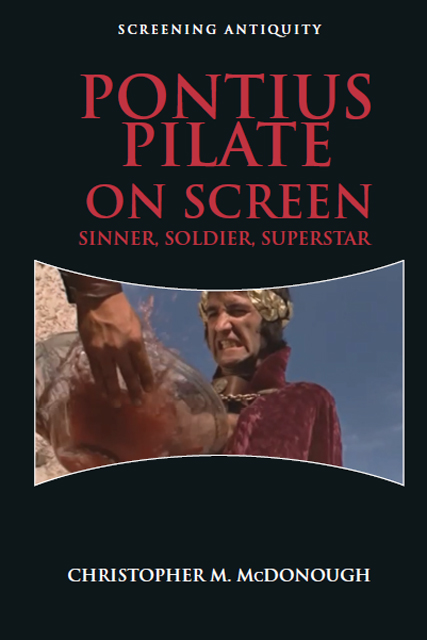Book contents
- Frontmatter
- Contents
- List of Figures
- Acknowledgements
- Series Editors’ Preface
- Frontispiece
- Prologue: ‘Do You Enjoy Being a Symbol, Pontius?’ The Trial of Pontius Pilate and Governor Collins
- 1 Quod Scripsi Scripsi
- 2 The Silent Pilate
- 3 The Roman in the Living Room: Pilate on TV in the Early 1950s
- 4 Mrs Pilate: Claudia Procula and Clare Boothe Luce
- 5 Pilate in CinemaScope, or Notes on Roman Camp
- 6 Finding Meaning in the Middlebrow: Pilate in the 1960s
- 7 What Is Truth? Pilate as 1970s Moral Relativist
- 8 Michael Palin’s Accent in Monty Python’s Life of Brian, and a Few Others
- 9 Grand and Not-So-Grand Inquisitors of the Reagan Age
- 10 ‘We at War’: Pilate for the New Millennium
- Epilogue: A Time of Handwashing
- Works Cited
- Index
1 - Quod Scripsi Scripsi
Published online by Cambridge University Press: 03 June 2023
- Frontmatter
- Contents
- List of Figures
- Acknowledgements
- Series Editors’ Preface
- Frontispiece
- Prologue: ‘Do You Enjoy Being a Symbol, Pontius?’ The Trial of Pontius Pilate and Governor Collins
- 1 Quod Scripsi Scripsi
- 2 The Silent Pilate
- 3 The Roman in the Living Room: Pilate on TV in the Early 1950s
- 4 Mrs Pilate: Claudia Procula and Clare Boothe Luce
- 5 Pilate in CinemaScope, or Notes on Roman Camp
- 6 Finding Meaning in the Middlebrow: Pilate in the 1960s
- 7 What Is Truth? Pilate as 1970s Moral Relativist
- 8 Michael Palin’s Accent in Monty Python’s Life of Brian, and a Few Others
- 9 Grand and Not-So-Grand Inquisitors of the Reagan Age
- 10 ‘We at War’: Pilate for the New Millennium
- Epilogue: A Time of Handwashing
- Works Cited
- Index
Summary
Then said the chief priests of the Jews to Pilate, Write not, The King of the Jews; but that he said, I am King of the Jews. Pilate answered, What I have written I have written.
– John 19:21–22This is not a book about Pontius Pilate. Not exactly.
The Roman figure who served as prefect of the province of Judaea from roughly 27 to 37 AD is known from numerous ancient works, and while his particular involvement with the Passion narrative is carefully observed, other details about his life remain shrouded in obscurity. The quest for the historical Pilate, like the quest for the historical Jesus, can be a frustrating experience. Although he played only a minor part in it, the story of the Passion occupies so central a role in the theology and history of Christianity that the figure of Pilate has come to take on a significance far exceeding his accomplishments. As the only mortal besides the Virgin Mary to be mentioned in the Apostles’ and Nicene Creeds, the prefect’s name has, since the fourth century AD, been uttered aloud more frequently than virtually any other from the Roman world, perhaps more often even than Julius or Augustus Caesar. Four of the earliest sources are located, of course, in the New Testament. The Gospels of Matthew, Mark, Luke and John offer a fairly, although not perfectly, consistent depiction of Pilate’s interactions with Jesus and the Jewish priests. Earlier still, Pilate had been a subject in the works of Flavius Josephus (Yosef ben Matityahu), the Romano-Jewish historian of the first century AD. In both his Jewish Antiquities and Jewish War, he discusses the administration of Judaea under Pontius Pilate. It is from Josephus, for instance, that we learn about the civil unrest provoked by Pilate’s introduction of Roman standards into Jerusalem and his use of Temple funds to construct an aqueduct – the latter the focus of much cinematic speculation (and the answer to the question asked in Monty Python’s Life of Brian by John Cleese’s Reg: ‘What have Romans ever done for us?’). The earliest work to deal with the prefect is On the Embassy to Gaius by the Hellenistic Jewish philosopher Philo of Alexandria, who also recounted unrest over Pilate’s activities as prefect and referred to him as ‘a man of inflexible, stubborn and cruel disposition’ (chapter 38).
- Type
- Chapter
- Information
- Pontius Pilate on ScreenSinner, Soldier, Superstar, pp. 13 - 26Publisher: Edinburgh University PressPrint publication year: 2022



